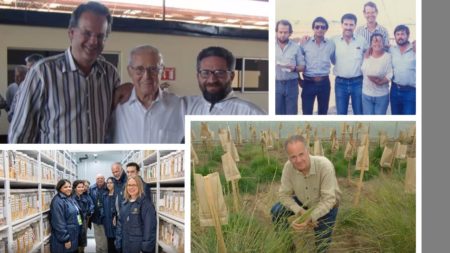Today we’re wishing Tom Payne a very long and happy retirement after over 30 years at CIMMYT, many of the later ones running the wheat genebank.

There’s a nice conversation with him on the WHEAT website.
What is one way we can ensure long-term conservation of staple crops around the world?
In the past few years, several internationally renowned germplasm collections have been destroyed due to civil conflicts, natural disasters and fires — for example in Aleppo, Cape Town and Sao Paulo. Each time, we hear what a shame it was that the destroyed heritage was lost, that it was irreplaceable and beyond value. When a genebank loses an accession, the ancestral lineage extending hundreds of generations becomes permanently extinct. Genebank managers recognize this threat, and hence duplicate samples of all accessions are now slowly being sent to the Global Seed Vault in Svalbard for long-term preservation.
A fond farewell today to Tom Payne, currently the Head of the Wheat Germplasm Collection as he retires after 33+ years at @CIMMYT. Steadfast commitment to & promotion of the many forms of diversity in crops & people globally. Read his recent reflections: https://t.co/CaAhqGRT2J pic.twitter.com/OmzaqUhkPe
— Alison Bentley (@AlisonRBentley) July 21, 2021
If you wanted a nice summary Tom’s legacy you could do worse than look at the recent paper Germplasm Acquisition and Distribution by CGIAR Genebanks, which is now part of a handsome, freely downloadable volume.